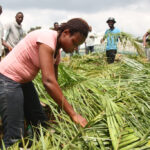A new herbal toothpaste, formulated from indigenous medicinal plants and fortified with charcoal, has been unveiled in Lagos, showing a firm determination by the government and private innovators to integrate traditional medicine into modern healthcare and boost local economic opportunities.
Nigeria’s vast oral care market is estimated at around US$664 million in revenue in 2025, with projections of a steady 7.4% compound annual growth rate (CAGR) over the coming years.
Toothpaste remains the dominant segment in this category, growing at 18% CAGR through 2030.
Even more striking is the expansion of the fluoride-free toothpaste segment, including herbal and charcoal products.
Valued at US$24.18 million in 2023, it is expected to grow nearly fivefold to US$106.9 million by 2035, as consumers seek natural, plant-based options.
Recently, toothpaste made with charcoal has gained currency, especially among Nigerian customers, who pine for a set of white teeth.
Whitening products is the fastest-growing oral care category globally.
But cost poses a stumbling block to this ambition. In Nigerian dental clinics, teeth-whitening procedures typically range between ₦50,000 and ₦150,000, depending on the method.
This is a steep cost for millions of Nigerian families, who turn to the whitening benefits of charcoal-formulated toothpastes.
By blending local medicinal herbs with charcoal, the new herbal toothpaste offers enhanced oral hygiene and a whitening effect at a lower cost than clinical treatment.
But its significance goes beyond dental health. Because its raw materials are sourced and processed locally, it also creates value across Nigeria’s economy.
Farmers grow the herbs, processors ready them for production, and distributors deliver them to the shop.
With this growing attraction for concerns about safety and performance.
Abiola David, an Abuja-based dentist, explains that “charcoal particles are abrasive and, with long-term or excessive use, might erode through the enamel and lead to sensitivity. However, if well formulated—with grit levels that are safe for the enamel and in combination with fluoride or remineralising agents—it might be safe and effective.”
A 2020 cross-sectional study conducted among dental professionals in a tertiary hospital in Nigeria revealed that only 44.7% of respondents were aware of charcoal-based toothpaste, and among those, just 54.3% recognized its potential uses for tooth whitening or preventing dental caries and periodontal disease
This knowledge gap highlights the importance of regulation, education, and product testing to ensure consumers benefit without risk.
The government has noted that the new brand meets those safety levels, and upon clearance by the relevant regulators, such as NAFDAC, consumers are assured that it is safe for use by the general public.
Officials also note that the launch is part of a broader policy direction—the development of a national pharmacopoeia of medicinal plants, standardisation of herbal products, and integration of traditional remedies into mainstream healthcare.
For most Nigerians, still, the problem is personal. John Adeyemi, 34, defined his battle with discoloured teeth.
“I drink coffee and eat kola nuts practically every day, and over the years, my teeth went brown. I once asked about whitening at a private clinic, but upon hearing the cost — ₦80,000, I just laughed, that’s twice my monthly wage. I just used my normal toothpaste, but the stains persisted,” he recounted.
Adeyemi’s story mirrors the dilemma faced by millions of Nigerians—costly whitening services and basic toothpaste that barely tackle the issue. Herbal innovations offer a middle ground: effective, affordable, and rooted in tradition.
The product also carries cultural weight. Charcoal has long been part of Nigerian households, not just for cooking but also for oral hygiene and medicine.
Many people recall parents and grandparents chewing or rubbing it directly on their teeth. These practices faded with the widespread adoption of imported toothpastes.
By reintroducing charcoal in a new, regulated, and convenient form, the product introduces consumers to heritage while offering them the safety and quality assurances of modern science.
Still, challenges remain for herbal oral care products to gain full acceptance — price sensitivity is one of the biggest barriers; even with local sourcing, herbal toothpaste often costs more than mass-market brands that line shelves.
Distribution is another hurdle, as many consumers in semi-urban and rural areas rely on small kiosks and open markets, where foreign or generic pastes are already entrenched.
There is also scepticism surrounding herbal products, which are perceived as crude and old-fashioned.
Without addressing these gaps, herbal toothpaste risks staying a niche rather than mainstream option.
However, bringing Nigeria’s own charcoal-formulated herbal toothpaste to market is an indication of government policy bearing fruit and a testament to customer desire for inexpensive innovation.
With the oral care market valued in the hundreds of millions of dollars and herbal toothpaste growing rapidly, the timing could hardly be better.
It will not by any means cure all problems, but it would be a big step toward a world in which oral hygiene isn’t a personal struggle at all but a shared solution—whitening smiles and fortifying communities side by side.
A new herbal toothpaste combining indigenous medicinal plants with charcoal has been launched in Lagos, supporting government efforts to incorporate traditional medicine into modern healthcare and stimulate local economy. The Nigerian oral care market is projected to reach $664 million in revenue by 2025, with a 7.4% CAGR. Highlighting a specific interest in fluoride-free options, this sector, valued at $24.18 million in 2023, is anticipated to grow fivefold by 2035 due to rising demand for natural products. Charcoal-formulated toothpaste, appealing for its whitening effects, presents an affordable alternative to costly teeth-whitening procedures in Nigerian dental clinics.
This new product not only enhances oral hygiene but also economically empowers the community through local sourcing and processing of raw materials. Concerns over safety, especially regarding charcoal's abrasiveness, are addressed through careful formulation and regulatory approvals, spotlighting the need for education and testing in this niche market. Despite this innovation, there are challenges in market acceptance due to price sensitivity, distribution hurdles, and skepticism towards herbal products. Nevertheless, the product signifies a shift towards marrying tradition with modern safety standards, offering consumers quality oral care options within reach.






